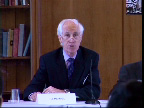Bio
T. J. Pempel is the Jack M.
Forcey Professor of Political Science at the University of California,
Berkeley. He has been on the Berkeley faculty since 2001. He has also held
positions at Cornell University, the University of Colorado, the University of
Wisconsin and the University of Washington. From 2001 until 2006 he was the
director of Berkeley’s Institute of East Asian Studies. He is a presidential
appointee to the Japan US Friendship Commission. His research focuses on
comparative politics, Japanese political economy, and Asian regional issues. He
has published over 120 articles and 24 books. Recent books include Security
Cooperation in Northeast Asia (Routledge, 2012); The Economic-Security Nexus in
Northeast Asia (Routledge, 2013), and Japan in Crisis (ASAN, 2013) and, in
2015, a co-edited volume with Keiichi Tsunekawa entitled Two Crises; Different
Reactions: East Asia and Global Finance (Cornell UP). This last examines why
Asia was so badly devastated by the crisis of 1997-98 but in 2008-2009 did so
well compared to Europe and the US.

